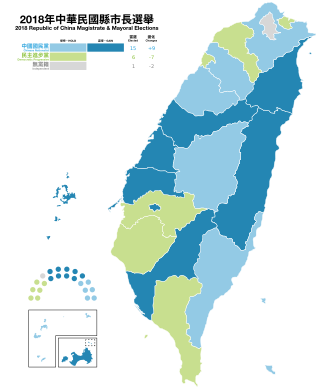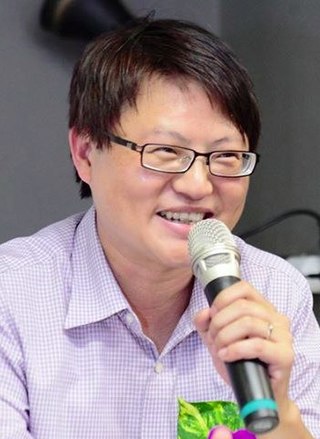
The Legislative Yuan is the unicameral legislature of the Republic of China (Taiwan) located in Taipei. The Legislative Yuan is composed of 113 members, who are directly elected for four-year terms by people of the Taiwan Area through a parallel voting system.

The Control Yuan is the supervisory and auditory branch of the government of the Republic of China, both during its time in mainland China and Taiwan.
In Taiwan, parliamentary elections are held every four years to elect the 113 members of the Legislative Yuan, the unicameral legislature of Taiwan. The current electoral system was introduced in 2008. The constitutional amendments of 2005 extended term length from three to four years, reduced seat count from 225 to 113, and abolished the National Assembly, originally another governmental organ equivalent to a chamber of parliament.
Nation-wide general and local elections are held every four years, typically in January and November. By-elections and referendums are held on occasion. Electoral systems include first-past-the-post, proportional representation, single non-transferable voting, and a parallel mixture of the above.

An election for the National Assembly took place in Taiwan on Saturday, 14 May 2005, from 07:30 to 16:00 local time. It elected an ad hoc National Assembly whose only function was to serve as a constituent assembly in order to approve or reject amendments to the Constitution of the Republic of China already proposed by the Legislative Yuan. The results indicated that the amendments would be approved, as the parties supporting them won an overwhelming majority, and indeed the amendments were passed on 7 June 2005.

Legislative elections were held in Taiwan on 12 January 2008 to elect the members of the Legislative Yuan. It was the first Legislative Yuan election after the constitutional amendments of 2005, which extended term length from three to four years, reduced seat count from 225 to 113, and introduced the current electoral system.

The 1st Legislative Yuan election was held in China between 21 and 23 January 1948. This election, and the preceding 1947 National Assembly election are the first elections of under the newly ratified 1947 Constitution of the Republic of China. Under this constitution, the Legislative Yuan is a standing legislature when the National Assembly is not in session. At the time most of Chinese territory was under the control of the government of the Republic of China, using a direct voting system elected 759 Legislative Representatives. Using the Republic's then 461 million population to calculate, on average 600,000 people elected one representative in the Legislative Yuan. The election along with the one held for the National Assembly also made China the largest democracy at the time.

Freddy Lim Tshiong-tso is a Taiwanese politician, musician, and independence activist. He is the lead vocalist of the Taiwanese heavy-metal band Chthonic. and the lead vocalist of the band Metal Clone X started by him and American guitarist Marty Friedman. Lim served as chair of Amnesty International Taiwan from 2010 to 2014. He was one of the founding leaders of the New Power Party (NPP) in Taiwan and represented the party in the Legislative Yuan until 2019. Lim won a second legislative term as an independent in 2020.
Referendums in Taiwan at both the national and local level are governed by the Referendum Act of Taiwan, which was enacted by the Legislative Yuan in December 2003. Citizens can propose laws via referendums at the national and local levels. The Referendum Act also allowed people to make changes or abolish laws by referendums.

Lisa Huang is a Taiwanese lawyer and politician. She served on the Legislative Yuan between 2012 and 2014.

Local elections were held on 24 November 2018 in Taiwan, to elect county magistrates, county (city) councilors, township mayors, township councilors and chiefs of village (borough) in 6 municipalities and 16 counties (cities). Elected officials would serve a four-year term. Polling stations were open from 08:00 to 16:00 on the election day.
By-elections for the Ninth Legislative Yuan were held in 2019, two on 27 January and four on 16 March, at Taiwan to elect 6 of the 113 members of the Legislative Yuan for the remaining term until 2020.

Legislative elections were held in Taiwan on 11 January 2020 for all 113 seats to the Legislative Yuan concurrently with the 15th presidential election. The term of the Legislative Yuan began on 1 February 2020.

The Taiwan Statebuilding Party is a political party in the Republic of China (Taiwan). The party was established in 2016 as Taiwan Radical Wings. The party is considered a rather close ally of the Democratic Progressive Party, while fighting to replace opposition parties whom TSP unilaterally claims as "not loyal to Taiwan", such as Kuomintang and Taiwan People's Party. In the 2024 Taiwanese legislative election, TSP failed to gain any seat in the Legislative Yuan and lost its status as a national political party.

Chen Po-wei is a Taiwanese politician. He was the first ever Taiwan Statebuilding Party candidate to be elected to the Legislative Yuan, defeating Kuomintang incumbent Yen Kuan-heng in the 2020 Taiwanese legislative election. In October 2021, Chen became the first member of the Legislative Yuan to lose his office via a successful recall election.

The 2020 Kaohsiung mayoral recall vote was a recall election held on 6 June 2020 to recall the incumbent mayor of Kaohsiung, Han Kuo-yu. The recall was successful, as the number of agree votes (939,090) outnumbered disagree votes and exceeded the minimum requirement of 574,996. An acting mayor was appointed by the Executive Yuan and held office until 24 August 2020, nine days after a by-election was held.
A by-election was held on 9 January 2022 in Taichung to elect one member of the Legislative Yuan for the Taichung City Constituency II for the remaining term until 2024. Democratic Progressive Party legislator Lin Ching-yi won the by-election for Taichung 2 to replace Chen Po-wei, who was recalled on 23 October 2021.
A constitutional referendum was held in Taiwan on 26 November 2022. Voters voted on adding Article 1-1 to the Additional Articles of the Constitution of the Republic of China. Had it passed, the voting age would have been lowered from 20 to 18 years. The amendment would also have lowered the minimum age of candidacy from 23 to 18 years once the relevant electoral laws had been amended accordingly.
By-elections for the Tenth Legislative Yuan were held in 2023, one each on 8 January and 4 March, in Taiwan to elect 2 of the 113 members of the Legislative Yuan for the remaining term until 2024. The Democratic Progressive Party flipped a seat from the Kuomintang in Nantou II, and the KMT retained its seat in Taipei III. After the DPP's victory in Nantou II, Frida Tsai would become the first DPP legislator to serve a district in Nantou County since the 2005 constitutional amendment halving the number of legislative seats from 225 to 113.

Legislative elections were held in Taiwan on 13 January 2024 to elect members of the Legislative Yuan. The elections were held alongside presidential elections.




















